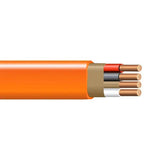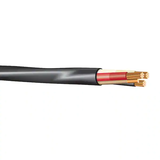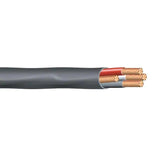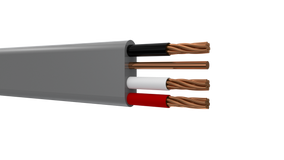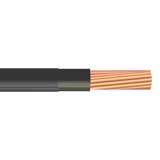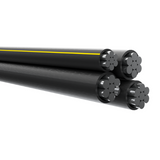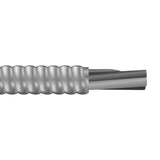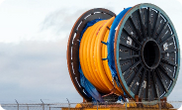A Guide To Wire Size and Types for Electric Stoves And Ovens

Installing a new electric stove, electric oven, or an electric range? Here is everything you need to know about the stove wire size and the type of cable to pick.
The size of copper wire for stoves, ovens, and ranges is:
- 20 Amp stove - 12 AWG
- 30 Amp stove/ oven/range - 10 AWG
- 40 Amp stove/ oven/range - 8 AWG
- 50 Amp stove/ oven/range - 6 AWG
- 60 Amp range -4 AWG
For aluminum wires, the sizing is the following:
- 20 Amp stove - 10 AWG
- 30 Amp stove/ oven/range - 8 AWG
- 40 Amp stove/ oven/range - 6 AWG
- 50 Amp stove/ oven/range - 4 AWG
- 60 Amp range -2 AWG
Circuit Breaker Power Requirements For Electric Ranges, Stoves, and Ovens
The power requirements for induction stoves are the same as for electric stoves, even though induction appliances are more energy-efficient.
To know the ampacity of the circuit used in your range, check the data plate, user manual, or manufacturer's website. 40- Amp ranges are most common in private homes, while 30-amp ranges are most common in small apartments.
- 30-amp electric ranges are found in smaller homes, apartments, or condos. They are generally sufficient for everyday cooking needs.
- 40-amp electric ranges are for medium to larger homes. They offer additional features and power for more sophisticated home cooking and baking.
- The 50-amp electric ranges may have special features like larger ovens, more burners, or special cooking modes.
- Compact electric cooktops with just two burners without an oven can operate on a 20 Amp circuit.
- 60-Amp ranges have multiple additional features, double ovens, and are more likely to be found in a commercial kitchen.
The ampacity of the stove is calculated when it is at a total capacity or very close to it. This is done in order not to strain an electrical circuit.
An electric oven, stove, and range operate on a 120/240-volt circuit and receptacle. The appliance uses a 120V circuit for timers, vent fans, lights, and digital clocks, while the actual heating elements use 240V. Outlet receptacles are only required for freestanding ranges, while drop-in ranges are usually hard-wired.
What Wire Do I Need For a 220 range?
The electrical circuit of the oven is wired with cables consisting of two hot conductors, one neutral and one ground. 4-conductor circuits have been an NEC requirement ever since 1996. The 3-conductor circuits for old ovens and ranges are no longer used on a massive scale.
Types of Cables Used For Stove Wiring
- NM-B Romex is the most popular type of wire for electric stoves, ovens and ranges. 10/3, 8/3, and 6/3 NM-B cables are the ones used most often. In most cases, it is your best choice for kitchen appliance wiring. The cables have the right design for wiring kitchen appliances, are safe, and are easily installed. They are also perfect for dry in-wall installations required for electric ranges.
- THHN/THWN in metal or PVC conduit can be used if some additional protection from moisture or physical damage is required, f. e., if the wire has to be exposed for some of its run. They are also used if electrical ranges are mounted on a surface.
- As per NEC Article 334, Type SE cable can be used for interior wiring, making it suitable for electric stoves as well. The type of cable used is SER, as it has the required number of conductors. However, there may be an issue with the ground conductor being uninsulated. If you are considering installing SER for your oven, consult the local codes first.
- Four-Conductor MC Cable may be used in the circumstances similar to THHN/THWN if allowed by the local code in your state/area.
- Aluminum analogs of all cables mentioned above are also viable contenders. However, copper NM-B should be your first choice in most circumstances.



